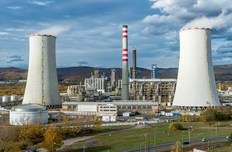- The PYREKOL project costs CZK 71.7 million, with CZK 50.2 million from the TREND subsidy programme.
- The pyrolytic technology investment is CZK 18 million, supported by the Ministry of Industry and Trade.
- The project aims to develop technology for reusing waste plastic and rubber in the petrochemical industry.
- The output will be used to produce chemicals like ethylene, propylene, butadiene, and benzene.

Project Overview
Unipetrol is constructing a pyrolytic unit for waste-plastic processing at its Litvínov plant. The unit will explore chemical recycling of plastic waste and its potential integration into standard production over the next three years. The PYREKOL research project, involving Unipetrol, the Institute of Chemical Technology in Prague, and the Unipetrol Centre for Research and Education, has a budget of CZK 71.7 million, with CZK 50.2 million funded by the TREND subsidy programme.
Investment and Support
The pyrolytic technology investment amounts to CZK 18 million, supported by the Ministry of Industry and Trade under the Enterprise and Innovations for Competitiveness programme. The project aims to chemically recycle waste plastic from the Czech Republic and potentially other parts of Central and Eastern Europe.
Circular Economy Goals
The initiative aligns with the circular economy concept, aiming to minimize waste and reduce emissions from plastic burning. The project seeks to develop functional technology for reusing waste plastic and rubber from tyres in the petrochemical industry, enhancing the utilization of existing plastic waste and lowering the carbon footprint.
Technical Challenges
Research will address improving the quality of pyrolytic by-products, storage solutions to prevent re-polymerization, and effective transportation methods. Various types of input materials will be tested to determine their impact on the utilization ratio and final product quality. The project will also explore safe mixing ratios to ensure continuous plastic production.
Expected Outcomes
The project aims to propose industrial-scale technology for processing waste plastic and rubber into valuable petrochemical products like ethylene, propylene, butadiene, and benzene. These products will be used to manufacture polyethylene, polypropylene, polystyrene, and motor fuels, aligning with EU waste management policies.

